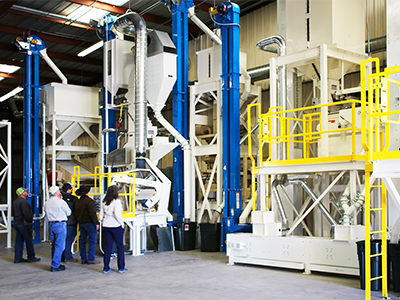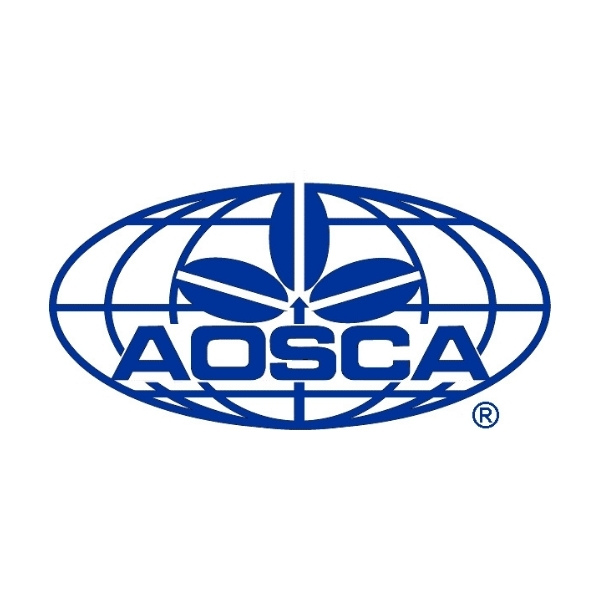Texas A&M AgriLife Foundation Seed serves as the liaison between Texas A&M AgriLife Research plant breeding programs and companies interested in licensing plant varieties.
Foundation Seed produces and markets genetically pure seeds of new plant cultivars developed by scientists of AgriLife Research. We also help to produce and distribute vegetatively propagated plant materials. At the same time, we provide production and seed conditioning services to public and private breeding programs.
We are located near Vernon, TX and are a self-supporting, nonprofit unit of AgriLife Research.
Commercialization
Foundation Seed works alongside the Texas A&M AgriLife Office of Intellectual Property and Commercialization, handling business aspects of research commercialization, allowing plant breeders and scientists to concentrate on research
Foundation Seed also serves as the liaison between AgriLife Research plant breeding programs and companies interested in licensing plant varieties
Funding & Licensing
Foundation Seed funds its operations via sales and services. It helps fund continuing research into new, high-yielding, better-adapted crop varieties.
Foundation Seed also works closely with various entities of Texas A&M AgriLife and The Texas A&M University System and corporations.
Contracts and Grants office on sponsored research agreements, material transfer agreements and production contracts with private growers. It works with seed companies to develop public/private partnerships and sponsored research agreements.
Additionally, Foundation Seed works closely with Texas A&M Technology and Commercialization to bring many plant material improvements to market assisting with licensing terms and drafting both noncommercial (evaluation) and commercial license agreements.
Licensing Management
Foundation Seed manages the executed license agreements, monitoring compliance and infringement issues and collecting fees and royalties on licensed plant materials
It also handles royalty collection services for several other land-grant institutions that market plant materials in the southwestern U.S.
Additionally, Foundation Seed serves as the sales and marketing vehicle for USDA Plant Materials Centers in Texas.
Memberships & Partnerships
Foundation Seed represents Texas A&M AgriLife in state, regional and national organizations such as the Texas Seed Trade Association, American Seed Trade Association, Turfgrass Producers of Texas, Association of Official Seed Certification Agencies (AOSCA), Seed Innovation and Protection Alliance (SIPA), Western Seed Trade Association. The organization is also active in the seed certification agencies located in every state where AgriLife licensed products are grown.
Foundation Seed also serves as a resource for many of our commodity board stakeholders as well as Texas AgriLife internal committees such as the Intellectual Property Management and Commercialization Team, Small Grains Advisory Committee, and Plant Review Committee.
Facilities at Texas A&M AgriLife Foundation Seed
Texas A&M AgriLife Foundation Seed originated in the 1950s with a seed plant near Texas A&M University in College Station. In 1990, Foundation Seed purchased an old seed-conditioning facility and greenhouse near Vernon and Pioneer, the original owners of the conditioning facility, donated an additional 5 acres of land. A large warehouse was constructed and conditioning equipment installed with funds provided by the Texas Wheat Producers Board, the E. Paul and Helen Buck Waggoner Foundation, and the Vernon Industrial Foundation.

Peanut Sheller
The 1-ton per hour capacity AgriLife Foundation Seed peanut sheller can process lots as small as 250 pounds and offers the rare ability to process identity-preserved peanuts. Read more.

Workshop
A well-equipped workshop facilitates on-site maintenance and equipment repair. It provides a secure area for chemical storage and a large general storage area. In addition, the workshop houses a hammer mill and an Eclipse seed cleaner for conditioning small quantities of seed harvested from experimental plots.
Local Partnerships
Local farmers are frequently contracted to grow foundation seed of the latest Texas A&M AgriLife wheat varieties. Harvesting is usually done by our staff using Foundation Seed-owned equipment that has been thoroughly cleaned to maintain the high standards of purity required for foundation seed.
Foundation Seed owns a combine and a test plot harvester for small areas of experimental seed. The small grains conditioning plant housed in our warehouse allows for strict supervision of the foundation seed crop.
Our warehouse’s small grains conditioning plant strictly supervises the foundation seed crop from planting through harvesting to conditioning, treating and bagging.
Staff at Texas A&M AgriLife Foundation Seed

Richard Vierling, Ph.D., Director
Dr. Richard Vierling is the Center Director at the Texas A&M AgriLife Research & Extension Center at Vernon. He is also the Manager of AgriLife Foundation Seed, and Senior Advisor for Business Strategies. Rick has a B.S. in Biochemistry and a M.S. in Agronomy from University of Missouri and Ph.D. (genetics/plant breeding) from Texas Tech University.

Sean Stephens, Assistant Manager
Sean Stephens is the Assistant Manager at AgriLife Foundation Seed. He is responsible for the daily operations at Texas AgriLife Foundation Seed with a goal of maintaining the purity and quality of the seed produced for the agricultural industry. He has a B.S. in Horticulture and Landscape Management from Tarleton State University.
Research Technician I
assists in the day to day operations of AgriLife Foundation Seed and the production of foundation seed.

Lileen Coulloudon, Manager, Customer Service
Lileen Coulloudon is a the Manager, Customer Service at AgriLife Foundation Seed. She assists in customer service and promotion of new seeds and plant materials developed by scientists at AgriLife Research. She has a B.B.A. in International Business and an MBA with an emphasis in Agricultural Business from New Mexico State University.
Processing Wheat
Leaving seed crops in the field until moisture levels are acceptable can lead to yield losses, quality losses, genetic contamination and loss of germination and vigor. Foundation Seed has a multipurpose drying facility for drying down foundation seed and breeder seed increases to service the wheat program. The seed-drying facilities also help safeguard harvested seed against adverse weather conditions.
Processing Peanuts
Foundation Seed is a buying point for foundation class peanuts grown locally under contract. Newly harvested farmer’s stock is run through a sand screen and cleaned of soil and other foreign matter. If needed, the peanuts are dried down to acceptable moisture content. After drawing samples from a farmer’s stock, the state inspector uses USDA-approved equipment to grade the seed peanuts. The resulting analysis for sound mature kernels, splits, foreign matter, percent of moisture, presence of aflatoxins and freeze damage forms the basis of reports to the USDA, payments to the National Peanut Board and payments to our contracted growers. The graded farmer’s stock is stored in separate partitions in the warehouse until it is taken by truck to a contracted sheller. Then, the seed peanuts are shelled in-house, treated and bagged for delivery to the licensed growers of those peanut varieties.













